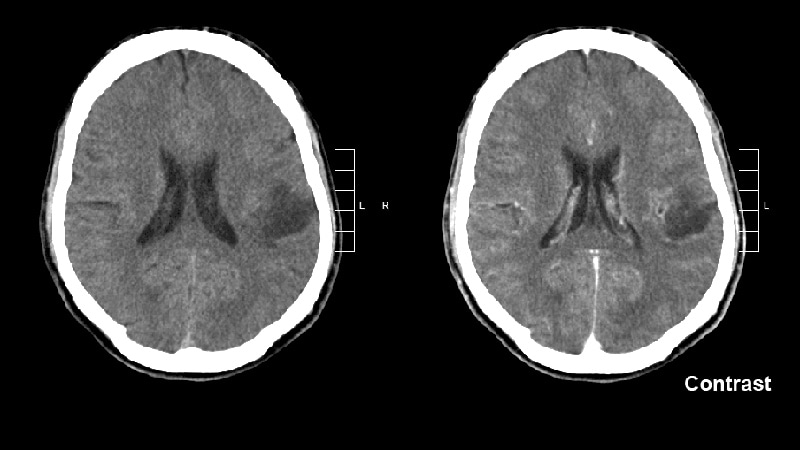Oral Drug Vorasidenib for Brain Tumor Treatment Landscape Change
Core Concepts
Oral drug vorasidenib shows significant efficacy in delaying disease progression and improving quality of life for patients with certain brain tumors.
Abstract
The article discusses the potential treatment landscape change for patients with a specific type of brain tumor using the oral targeted drug vorasidenib. Key highlights include:
- Vorasidenib awaiting approval for gliomas with IDH1 and IDH2 mutations.
- Phase 3 INDIGO trial results show significant delay in disease progression with vorasidenib.
- Median progression-free survival of 27.7 months with vorasidenib compared to 11.1 months with placebo.
- Vorasidenib associated with longer time to next treatment and well-tolerated by patients.
- Potential to delay toxic chemotherapies and radiation, improving long-term survival and quality of life.
- Vorasidenib is an oral inhibitor of IDH1 and IDH2 enzymes, crossing the blood-brain barrier.
- Study details of the INDIGO trial involving 331 patients with grade 2 gliomas with IDH mutations.
- Adverse events and fast-track status from the US FDA for vorasidenib.
Customize Summary
Rewrite with AI
Generate Citations
Translate Source
To Another Language
Generate MindMap
from source content
Visit Source
www.medscape.com
Oral Drug for Brain Tumor Could Change Treatment Landscape
Stats
The median progression-free survival (PFS) was 27.7 months for patients on vorasidenib, compared with 11.1 months for patients assigned to placebo (hazard ratio (HR) for progression or death with vorasidenib of 0.39 (P < .0001)).
The time to next therapy was significantly longer with vorasidenib, with a median not yet reached, compared to 17.4 months for placebo (hazard ratio, 0.26, P < .001).
Grade 3 or 4 alanine aminotransferase elevations occurred in 9.6% of patients assigned to vorasidenib, but not in the placebo group.
Quotes
"The results of this study really suggest that in selected patients with IDH mutant low-grade gliomas we can potentially delay the use of these toxic chemotherapies and radiation, maybe for years if not many years, and as a result delay the long-term toxicities of those therapies in a group of patients who typically are experiencing long-term survival." - Glenn Lesser, MD
Key Insights Distilled From
by Neil Osterwe... at www.medscape.com 06-04-2023
https://www.medscape.com/viewarticle/992745
Deeper Inquiries
How might the introduction of vorasidenib impact the current standard of care for brain tumor treatment?
The introduction of vorasidenib could significantly impact the current standard of care for brain tumor treatment by offering a targeted oral therapy for patients with gliomas bearing mutations in IDH1 and IDH2. The results from the pivotal phase 3 INDIGO trial showed a significant delay in disease progression with vorasidenib compared to placebo, with a median progression-free survival of 27.7 months versus 11.1 months. This could potentially change the treatment landscape by providing an effective alternative to more toxic chemotherapy and radiation. Vorasidenib's ability to cross the blood-brain barrier and its association with longer time to next treatment could lead to a shift towards delaying the use of traditional therapies in selected patients, thereby reducing long-term toxicities and improving quality of life.
What potential challenges or limitations could arise from the widespread use of vorasidenib in clinical practice?
Despite its promising results, the widespread use of vorasidenib in clinical practice may present certain challenges and limitations. One potential challenge could be the management of adverse events associated with the drug, such as elevated liver enzymes, fatigue, headache, diarrhea, and nausea. Monitoring and addressing these side effects effectively will be crucial to ensure patient safety and adherence to treatment. Additionally, the cost of vorasidenib and access to the medication could be barriers for some patients, especially in healthcare systems with limited resources. Furthermore, the long-term efficacy and safety of vorasidenib beyond the duration of the clinical trials will need to be closely monitored to assess its real-world effectiveness and potential for resistance development.
How can advancements in precision medicine for brain tumors influence the broader landscape of oncology research and treatment?
Advancements in precision medicine for brain tumors, exemplified by drugs like vorasidenib targeting specific mutations, have the potential to revolutionize the broader landscape of oncology research and treatment. By identifying and targeting genetic alterations driving tumor growth, precision medicine allows for personalized and more effective therapies tailored to individual patients. This approach not only improves treatment outcomes but also minimizes unnecessary exposure to toxic treatments, reducing treatment-related side effects and improving quality of life. Furthermore, precision medicine opens up avenues for combination therapies and novel treatment strategies, paving the way for more targeted and efficient cancer treatments across different tumor types. The success of precision medicine in brain tumors can serve as a model for other cancers, driving research towards more targeted and effective therapies in oncology.
0
